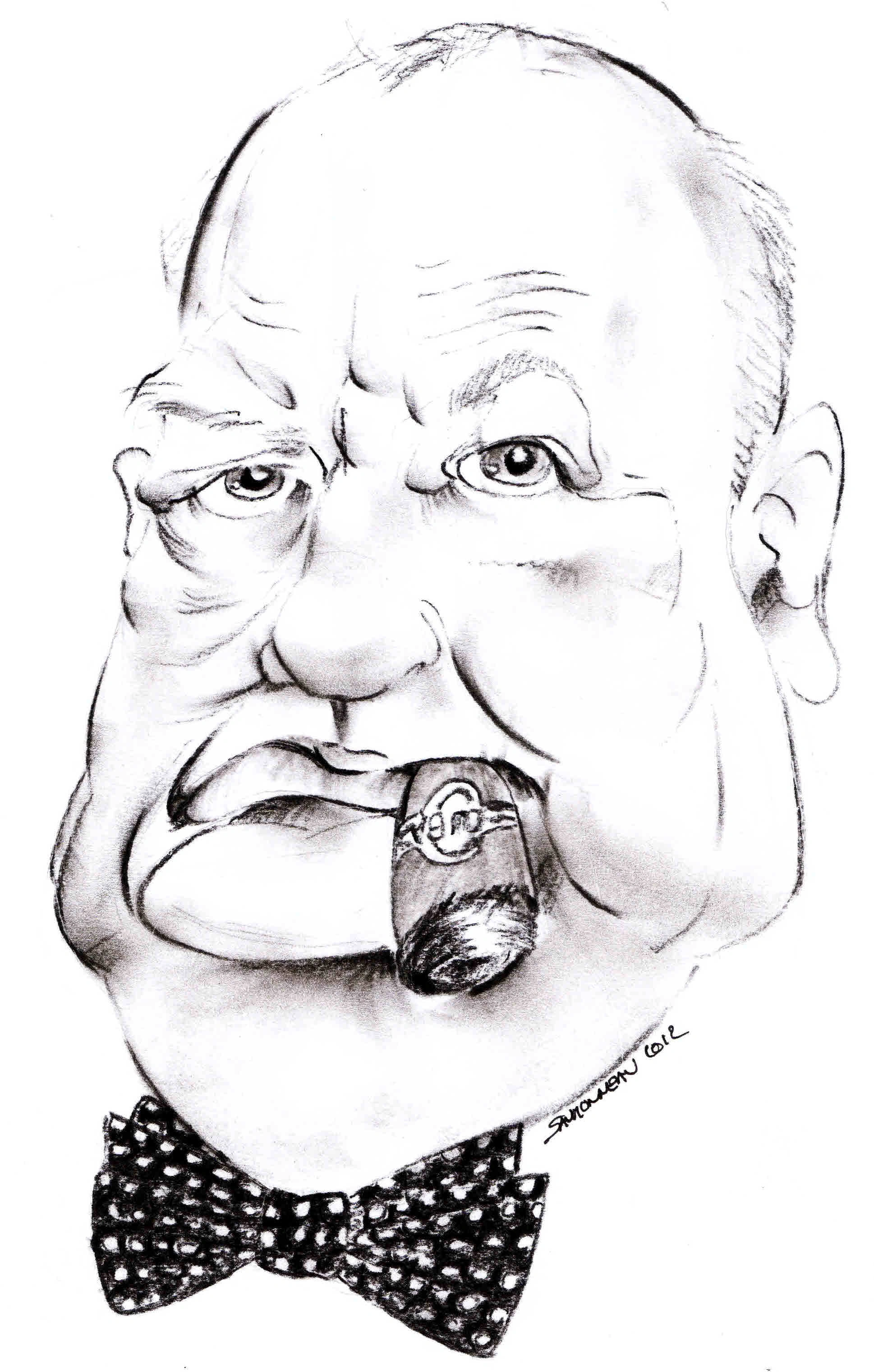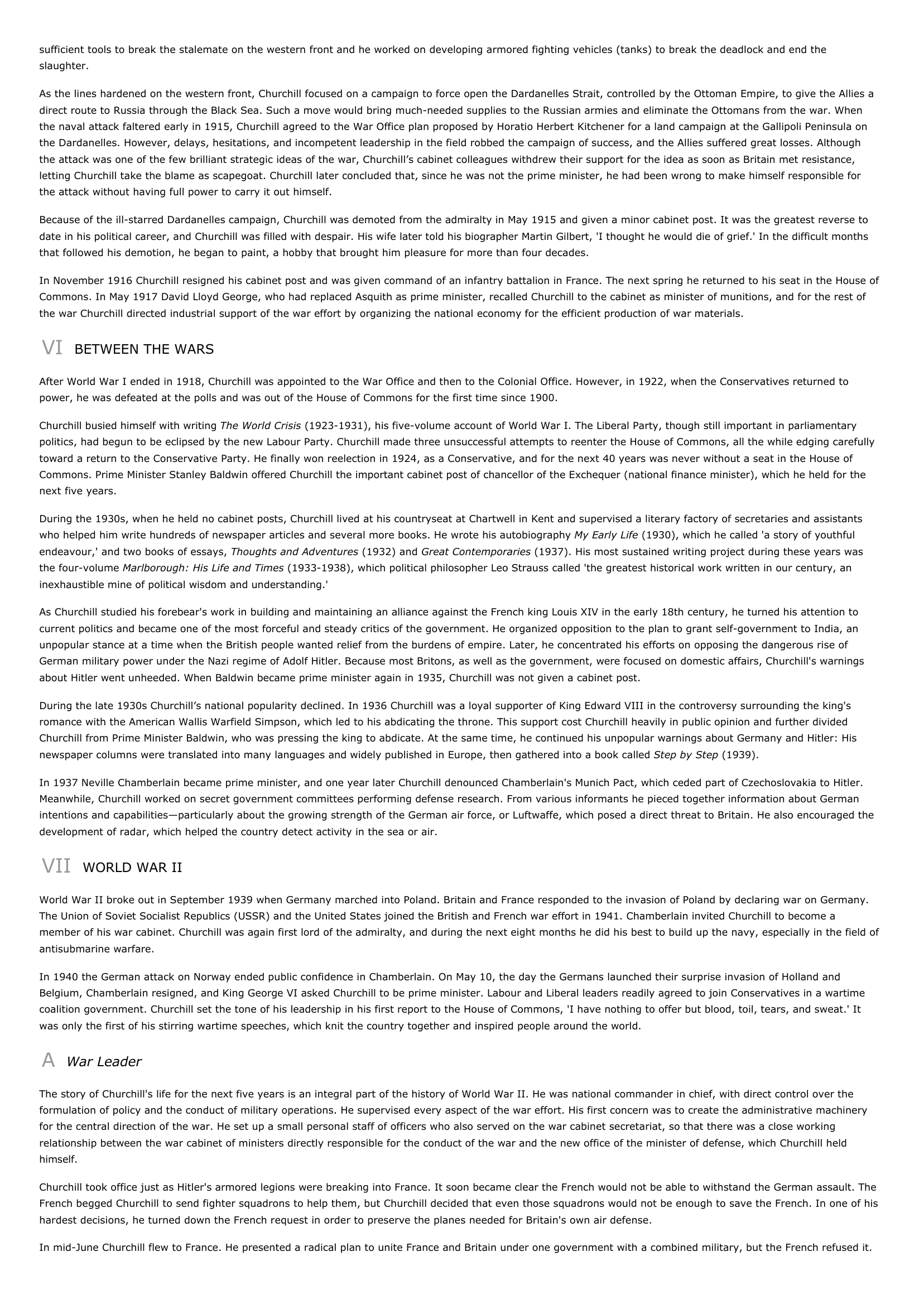Winston Churchill I INTRODUCTION Winston Churchill (1874-1965), British politician and prime minister of the United Kingdom (1940-1945, 1951-1955), widely regarded as the greatest British leader of the 20th century.
Publié le 10/05/2013

Extrait du document


«
sufficient tools to break the stalemate on the western front and he worked on developing armored fighting vehicles (tanks) to break the deadlock and end theslaughter.
As the lines hardened on the western front, Churchill focused on a campaign to force open the Dardanelles Strait, controlled by the Ottoman Empire, to give the Allies adirect route to Russia through the Black Sea.
Such a move would bring much-needed supplies to the Russian armies and eliminate the Ottomans from the war.
Whenthe naval attack faltered early in 1915, Churchill agreed to the War Office plan proposed by Horatio Herbert Kitchener for a land campaign at the Gallipoli Peninsula onthe Dardanelles.
However, delays, hesitations, and incompetent leadership in the field robbed the campaign of success, and the Allies suffered great losses.
Althoughthe attack was one of the few brilliant strategic ideas of the war, Churchill’s cabinet colleagues withdrew their support for the idea as soon as Britain met resistance,letting Churchill take the blame as scapegoat.
Churchill later concluded that, since he was not the prime minister, he had been wrong to make himself responsible forthe attack without having full power to carry it out himself.
Because of the ill-starred Dardanelles campaign, Churchill was demoted from the admiralty in May 1915 and given a minor cabinet post.
It was the greatest reverse todate in his political career, and Churchill was filled with despair.
His wife later told his biographer Martin Gilbert, 'I thought he would die of grief.' In the difficult monthsthat followed his demotion, he began to paint, a hobby that brought him pleasure for more than four decades.
In November 1916 Churchill resigned his cabinet post and was given command of an infantry battalion in France.
The next spring he returned to his seat in the House ofCommons.
In May 1917 David Lloyd George, who had replaced Asquith as prime minister, recalled Churchill to the cabinet as minister of munitions, and for the rest ofthe war Churchill directed industrial support of the war effort by organizing the national economy for the efficient production of war materials.
VI BETWEEN THE WARS
After World War I ended in 1918, Churchill was appointed to the War Office and then to the Colonial Office.
However, in 1922, when the Conservatives returned topower, he was defeated at the polls and was out of the House of Commons for the first time since 1900.
Churchill busied himself with writing The World Crisis (1923-1931), his five-volume account of World War I.
The Liberal Party, though still important in parliamentary politics, had begun to be eclipsed by the new Labour Party.
Churchill made three unsuccessful attempts to reenter the House of Commons, all the while edging carefullytoward a return to the Conservative Party.
He finally won reelection in 1924, as a Conservative, and for the next 40 years was never without a seat in the House ofCommons.
Prime Minister Stanley Baldwin offered Churchill the important cabinet post of chancellor of the Exchequer (national finance minister), which he held for thenext five years.
During the 1930s, when he held no cabinet posts, Churchill lived at his countryseat at Chartwell in Kent and supervised a literary factory of secretaries and assistantswho helped him write hundreds of newspaper articles and several more books.
He wrote his autobiography My Early Life (1930), which he called 'a story of youthful endeavour,' and two books of essays, Thoughts and Adventures (1932) and Great Contemporaries (1937).
His most sustained writing project during these years was the four-volume Marlborough: His Life and Times (1933-1938), which political philosopher Leo Strauss called 'the greatest historical work written in our century, an inexhaustible mine of political wisdom and understanding.'
As Churchill studied his forebear's work in building and maintaining an alliance against the French king Louis XIV in the early 18th century, he turned his attention tocurrent politics and became one of the most forceful and steady critics of the government.
He organized opposition to the plan to grant self-government to India, anunpopular stance at a time when the British people wanted relief from the burdens of empire.
Later, he concentrated his efforts on opposing the dangerous rise ofGerman military power under the Nazi regime of Adolf Hitler.
Because most Britons, as well as the government, were focused on domestic affairs, Churchill's warningsabout Hitler went unheeded.
When Baldwin became prime minister again in 1935, Churchill was not given a cabinet post.
During the late 1930s Churchill’s national popularity declined.
In 1936 Churchill was a loyal supporter of King Edward VIII in the controversy surrounding the king'sromance with the American Wallis Warfield Simpson, which led to his abdicating the throne.
This support cost Churchill heavily in public opinion and further dividedChurchill from Prime Minister Baldwin, who was pressing the king to abdicate.
At the same time, he continued his unpopular warnings about Germany and Hitler: Hisnewspaper columns were translated into many languages and widely published in Europe, then gathered into a book called Step by Step (1939).
In 1937 Neville Chamberlain became prime minister, and one year later Churchill denounced Chamberlain's Munich Pact, which ceded part of Czechoslovakia to Hitler.Meanwhile, Churchill worked on secret government committees performing defense research.
From various informants he pieced together information about Germanintentions and capabilities—particularly about the growing strength of the German air force, or Luftwaffe, which posed a direct threat to Britain.
He also encouraged thedevelopment of radar, which helped the country detect activity in the sea or air.
VII WORLD WAR II
World War II broke out in September 1939 when Germany marched into Poland.
Britain and France responded to the invasion of Poland by declaring war on Germany.The Union of Soviet Socialist Republics (USSR) and the United States joined the British and French war effort in 1941.
Chamberlain invited Churchill to become amember of his war cabinet.
Churchill was again first lord of the admiralty, and during the next eight months he did his best to build up the navy, especially in the field ofantisubmarine warfare.
In 1940 the German attack on Norway ended public confidence in Chamberlain.
On May 10, the day the Germans launched their surprise invasion of Holland andBelgium, Chamberlain resigned, and King George VI asked Churchill to be prime minister.
Labour and Liberal leaders readily agreed to join Conservatives in a wartimecoalition government.
Churchill set the tone of his leadership in his first report to the House of Commons, 'I have nothing to offer but blood, toil, tears, and sweat.' Itwas only the first of his stirring wartime speeches, which knit the country together and inspired people around the world.
A War Leader
The story of Churchill's life for the next five years is an integral part of the history of World War II.
He was national commander in chief, with direct control over theformulation of policy and the conduct of military operations.
He supervised every aspect of the war effort.
His first concern was to create the administrative machineryfor the central direction of the war.
He set up a small personal staff of officers who also served on the war cabinet secretariat, so that there was a close workingrelationship between the war cabinet of ministers directly responsible for the conduct of the war and the new office of the minister of defense, which Churchill heldhimself.
Churchill took office just as Hitler's armored legions were breaking into France.
It soon became clear the French would not be able to withstand the German assault.
TheFrench begged Churchill to send fighter squadrons to help them, but Churchill decided that even those squadrons would not be enough to save the French.
In one of hishardest decisions, he turned down the French request in order to preserve the planes needed for Britain's own air defense.
In mid-June Churchill flew to France.
He presented a radical plan to unite France and Britain under one government with a combined military, but the French refused it..
»
↓↓↓ APERÇU DU DOCUMENT ↓↓↓
Liens utiles
- Adolf Hitler I INTRODUCTION Adolf Hitler (1889-1945), German political and military leader and one of the 20th century's most powerful dictators.
- Declaration by United Nations Soon after the bombing of Pearl Harbor on December 7, 1941, British prime minister Winston Churchill met with United States president Franklin D.
- Henri Matisse Henri Matisse (1869-1954), French artist, leader of the fauve group (see Fauvism), regarded as one of the great formative figures in 20th-century art, a master of the use of color and form to convey emotional expression.
- Mao ZedongIINTRODUCTIONMao Zedong (1893-1976), foremost Chinese Communist leader of the 20th century and the principal founder of the People's Republic of China.
- William Shakespeare I INTRODUCTION William Shakespeare English playwright and poet William Shakespeare, who lived in the late 1500s and early 1600s, is regarded as the greatest dramatist in the history of English literature.







